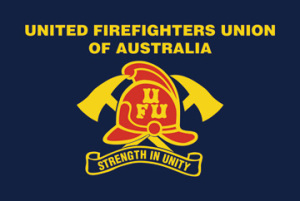What is pfas?
Pfas is a chemical designed to help firefighters suppress fires. Pfas can be found in a range of domestic and industrial settings, including non-stick fry pans, fabric protection and weather-proofing on raincoats.
Pfas is a group of around 3000 chemicals. Currently, we can only test for the presence of 30 pfas variants in the human body.
Why is pfas used for fires?
Pfas is used on flammable liquid fires for its heat resistant qualities. Pfas forms a barrier between the flammable liquid/vapours and the atmosphere, thus breaking the fire triangle by starving the combustion reaction of atmospheric oxygen.
What does pfas mean for my health?
Pfas can enter our body through absorption, inhalation and consumption.
The UFU is working with researchers studying how long pfas remains in the human body and how quickly pfas concentrations can be reduced.
Scientists cannot conclusively find a direct link between pfas contamination and ill health, but there is strong correlatory evidence that has prompted the commissioning of further research.
Evidence suggests that pfas may contribute to:
- High cholesterol
- Heart disease
- Cancers, in particular prostate cancer
- Decreased fertility
- Gout
- Increased risk of asthma
- Liver damage
- Birth defects
- Behavioural problems in children from contaminated parent/s
Should Firefighters be tested for pfas contamination?
Yes, the UFU recommends that every Firefighter has regular blood tests to measure the concentration of pfas.
As pfas is a widely recognised occupational hazard for Firefighters, your employer should be providing a regular system of blood testing.
How long does pfas last in the environment?
That is a big question, pfas is a persistent chemical meaning they endure and last in the environment after release and they are also bioaccumulative, therefore the concentration continually increases in the environment as they are used.
These chemicals will flow in streams and creeks and alarmingly they access the water table, increasing at the same time, which can be devastating for any downstream food producing enterprises.
Pfas has far reaching effects on the enviroment with pfas being able to travel in dust and water which impacts plants and wildlife. It is known that bears in the arctic have high levels of contamination.
Has anybody in Australia been compensated for pfas contamination?
Yes, there have been several claims made and compensation or settlements have been agreed for individual claims, including claims related to relocation of a family home or for a reduction of property value.
Have TFS taken adequate action to protect Firefighters?
No.
Pfas is found in B-class foam Tridol 3-6%. Widespread use of this foam was discontinued in every other state of Australia years ago, but continues to be used in Tasmania.
TFS is supposed to be working toward replacing B-class pfas foam, but the relevant working group has not met for some time.
TFS has not implemented a system of blood testing to monitor the concentration of pfas in Firefighters.
Tasmanian Firefighters’ have been left in the dark on their health and forced to continue using a foam that puts their own health at risk while they work to protect the Tasmanian community.
What is your union doing on pfas?
The UFUA has been at the forefront of pfas research and lobbying. The UFUA has been involved in international forums raising and regulating the use of pfas to protect Firefighters and communities impacted by pfas contamination.
In Tasmania, the UFUA is lobbying the TFS to move toward a new B class foam system and to get members blood tested.
We are currently waiting on the results of a world first study into pfas contamination in firefighters and the reduction of pfas in the body, the results will be out soon.
The UFUA has a range of chemists and scientists working collaboratively with our national office to provide cutting edge expertise and advice.
We will keep you up to date on any progress. Please speak with your workplace rep if you have any questions.
Related Article: https://www.abc.net.au/news/2016-05-24/report-into-cfa-fiskville-training-facility-tabled-in-parliament/7440840
The post Pfas FAQ appeared first on UFUA Tasmania.

